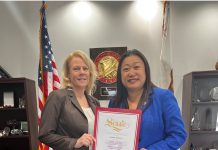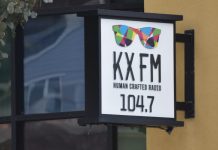With the chance that new state legislation might lower the amount of money public school districts can hold in reserve, school leaders received a report Tuesday that recommends borrowing from one of its own pots to pump up another.
Just to be safe, board members are poised to cut an $18 million special reserve account by more than half and reallocate $10 million to existing capital improvement and retiree benefit funds, said Dean West, assistant superintendent of business services.
By taking steps now, the district can avoid the impact of the proposed legislation, West. “All of a sudden, they could wave their magic wand at the state and all of a sudden we could be subject to the cap.”
The money will pay for changes at all four schools over the next 10 years without the need for a bond measure. Plans call for new and renovated classrooms, renovating the high school library, improving the football stadium and increasing neighborhood safety around the baseball field, plans that were presented to the board Tuesday by Jeff Dixon, the district’s facilities director. The $10 million from the special reserve fund will be replenished as the money is spent on facilities’ improvements, West said.
For the first time, the new state law, which has not yet gone into effect, requires a cap on the amount of money a school district can hold in reserve if certain variables are met. The state-mandated cap limits general reserves at 3 to 6 percent, depending on growing enrollment and revenue gains. LBUSD’s general fund balance is $52.9 million with $5.6 million in reserve, which is in addition to the $18 million special reserve.
The cap would limit reserves to between $1.5 million to $3 million in LBUSD’s general fund, said West. On top of that, the district has a local reserve requirement of 2 percent, West said. The intent is to maintain a balanced budget with savings, spending on what would maximize the students’ ability to learn, he said. That, he said, is a local decision.
The law, which has met criticism from schools as well as the state Legislative Analyst’s Office, is currently directed at broad-based reserve accounts, such as the general fund and assigned and unassigned funds that have no specific restrictions, West said.
The board already commits the special reserve money for specific purposes, including rainy-day emergencies, avoiding outside borrowing and safeguarding against a drop in property-tax revenue.
The concern is that the new law invalidates the purpose of the district’s savings, intended to protect the district from a potential change in its principle funding source, local property taxes.
“That’s kind of the heart of it,” West said. “The reserve is just being moved and used for cash-flow purposes and it’s being replenished so the same balance is still available.”
The district and taxpayers want a special “rainy day” fund to cover changes in, say, the percentage of property tax revenue the district receives, board president Ketta Brown commented at Tuesday’s meeting. “To ensure that,” she said, “we have to move it, legally, of course. We can’t show that we have too much reserve. The state will say we have to spend it.”
Laguna is known as a basic aid district, deriving its revenue from local property taxes. Tax revenue exceeds the per-pupil allotment other districts receive from the state. The legislative analyst’s office asked the state legislature to remove basic aid districts from being affected by the new law, but the request was denied, according to West’s report.
As a basic aid district, property tax revenue is distributed to the district in December, West explained. “We need more cash than everybody else does because the state’s not giving us money for July through December,” he said. “Those reserve levels shouldn’t apply to us because it wouldn’t give us enough cash to pay payroll from July to December.”
Laguna is avoiding the reserve-cap issue by holding less money in the general fund and putting it in the capital improvements fund while reducing expenses for funding capital improvements. “We don’t have to go out and borrow money because we’re borrowing from ourselves,” West said.
Any state-mandated changes to school district reserves won’t take place until after the legislature commences again in January, West said.
Final action is expected at the next board meeting, which is on Monday, Nov. 9.




